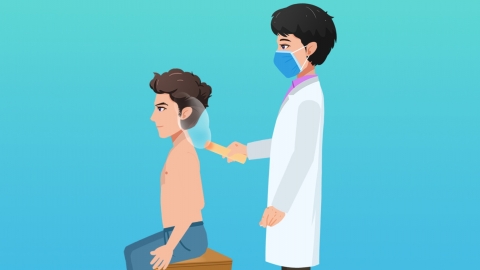How to treat arm numbness and pain caused by cervical nerve compression
Generally, numbness and pain in the arms caused by cervical nerve compression may be due to prolonged poor posture, degenerative changes in the cervical spine, cervical disc herniation, cervical spinal stenosis, syringomyelia, and other related conditions. General treatments and medication therapy can be employed to improve the symptoms. Prompt medical consultation is necessary, and treatment should follow medical advice. Details are as follows:

1. Prolonged poor posture: Maintaining incorrect posture for extended periods, such as looking down at a phone or computer for long durations or sitting for prolonged work or study sessions, may lead to abnormal curvature of the cervical spine, compressing nerve roots and causing arm numbness and pain. It is important to improve lifestyle habits by avoiding prolonged head-down positions or maintaining the same posture for extended periods. Performing neck stretching exercises can help relieve tension in the neck muscles.
2. Degenerative changes in the cervical spine: With aging, the cervical spine may undergo degenerative changes, such as disc herniation and bone spurs. These structural abnormalities may directly compress nerve roots, causing arm numbness and pain. Symptoms can be alleviated through physical therapy, such as traction and massage.
3. Cervical disc herniation: The intervertebral discs in the cervical spine are located between two vertebrae and serve as cushions and supports. When the fibrous ring of the disc ruptures, the inner soft nucleus material may protrude, compressing nearby nerve roots, leading to arm numbness and pain, often accompanied by neck pain. Pain-relieving and anti-inflammatory medications such as Gentengping Granules, ibuprofen sustained-release capsules, and acetaminophen tablets may be used under a physician's guidance.
4. Cervical spinal stenosis: Cervical spinal stenosis refers to a reduction in the space within the cervical spinal canal, which subsequently compresses the nerve roots. This compression may lead to nerve root ischemia and edema, resulting in arm numbness and pain, often accompanied by neck stiffness. Treatment options may include posterior decompression surgery, anterior decompression surgery, or posterior total laminectomy, all performed under a physician's guidance.
5. Syringomyelia: Syringomyelia is a rare neurological disorder characterized by the formation of abnormal fluid-filled cavities within the spinal cord. These cavities may compress cervical nerve roots, causing arm numbness and pain, often accompanied by sensory disturbances. Medications such as mecobalamin tablets, vitamin B12 tablets, and indomethacin tablets may be used under medical guidance to provide nerve nutrition and pain relief.
Maintaining good lifestyle and dietary habits in daily life can help prevent cervical spine diseases.





